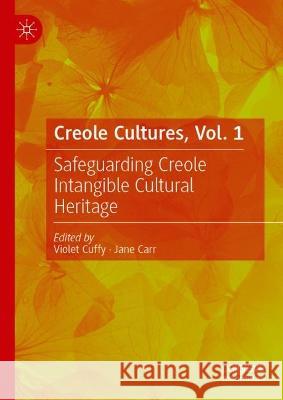Creole Cultures, Vol. 1: Safeguarding Creole Intangible Cultural Heritage » książka
Creole Cultures, Vol. 1: Safeguarding Creole Intangible Cultural Heritage
ISBN-13: 9783031242748 / Angielski
This edited collection considers the significance of Creole cultures within current, changing global contexts. With a particular focus on post-colonial Small Island Developing States, it brings together perspectives from academics, policy makers and practitioners including those based in Dominica, St Lucia, Seychelles and Mauritius. Together they provide a rich exploration of issues that arise in relation to safeguarding the intangible cultural heritage that sustains Creole identities.Commencing with considerations of the UNESCO (2003) Convention for the Safeguarding of the Intangible Cultural Heritage (ICH), the collection then presents case studies from the Seychelles, Mauritius, St. Lucia and Dominica. These attest to the many and different ways through which Creole cultural practices remain significant to the lived experiences of Creole communities. These chapters exemplify how through activities such as storytelling, singing, dancing, making artworks and the alternative economic practice of koudmen,Creole peoples sustain cultural identities that draw strength from their traditions. Yet there is also recognition of the continual struggle to sustain Creole cultural practices in the face of global economic and political pressures and related uncertainties. This global economic landscape also has an impact upon how Creole cultures are presented to tourists and hence upon the ways in which cultural practices are supported.
This edited collection considers the significance of Creole cultures within current, changing global contexts. With a particular focus on post-colonial Small Island Developing States, it brings together perspectives from academics, policy makers and practitioners including those based in Dominica, St Lucia, Seychelles and Mauritius. Together they provide a rich exploration of issues that arise in relation to safeguarding the intangible cultural heritage that sustains Creole identities.Commencing with considerations of the UNESCO (2003) Convention for the Safeguarding of the Intangible Cultural Heritage (ICH), the collection then presents case studies from the Seychelles, Mauritius, St. Lucia and Dominica. These attest to the many and different ways through which Creole cultural practices remain significant to the lived experiences of Creole communities. These chapters exemplify how through activities such as storytelling, singing, dancing, making artworks and the alternative economic practice of koudmen, Creole peoples sustain cultural identities that draw strength from their traditions. Yet there is also recognition of the continual struggle to sustain Creole cultural practices in the face of global economic and political pressures and related uncertainties. This global economic landscape also has an impact upon how Creole cultures are presented to tourists and hence upon the ways in which cultural practices are supported.











